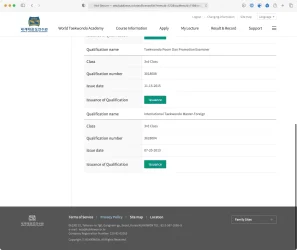andyjeffries
Senior Master
Gooood question!How many instructors are approved at a time for these courses? Are they listed somewhere?
So I don't know specifically what you mean by "approved", I can see two potential meanings:
1. Approved to take the course - there's an application process, although as I understand it almost everyone that's qualified enough is allowed. So when I took the course in 2013, there were approximately 150 international masters. The hall was SLAMMED busy! This was about the limit for Kukkiwon in my opinion. Taekwondowon has bigger halls so could potentially take more, however, I worry that many more would make for lower quality education - even with assistants, there's only so much teaching you can do to such a big group. When I went back in 2016 I think there were about the same total number, but they then split it in to 3rd Class in one group and 2nd/1st Class in a second group. This helped a lot.
2. Approved/qualified as masters afterwards - I don't know the official stats, but anecdotally I've heard that the pass rate is about 50-60% of candidates. I certainly personally know people that have failed Kukkiwon courses, so it's definitely not a rubber stamp.
Given that as of last year (or the year before?) it's a requirement for Kukkiwon Membership System (Dan promotion system) application, I'd imagine more people will be doing it.
Regarding listing somewhere, not that I know of. For some reason Kukkiwon seems to not like doing this (I've never asked why). There is an online page at wta.kukkiwon.or.kr that lists the record of the person logging in (so you can check your results, etc) but you can't search for other people. In case people haven't seen this page/site and it's of interest, here's a screenshot (not trying to brag/boast and my certs are already online - but thought as not everyone has access it may be nice for some to see it):
(WTA is "World Taekwondo Academy", not the best naming as to me it implies affiliation with "World Taekwondo" rather than Kukkiwon, but it's basically the instructor/judge educational department within Kukkiwon)

